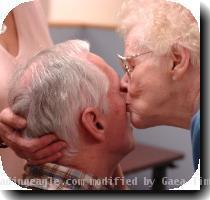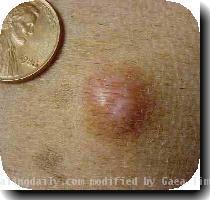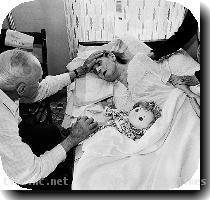A father’s descent into Alzheimer’s pressures a caregiver-son, and murder is charged
By Matt Sedensky, APSunday, November 8, 2009
Murder case a glimpse into stresses of caretaking
FORT LAUDERDALE, Fla. — The scenes seared into the minds of those who know Bobby Yurkanin differed only in place: Whether in the pool, around the dinner table or at the bowling alley, he was the 50-something man whose life had long before been handed over to the sickness of his parents. Always his father was by his side.
Yurkanin moved across the country to care for his dying mother, only to do it all over as his father sank into the fog of Alzheimer’s disease. When the octogenarian grew combative, his son would calm him. When he didn’t want to eat, his namesake would cajole him to take some fruit.
The son assumed his caretaker role out of necessity, friends said, despite a strained family history and a less-than-perfect childhood. And those who observed him and his father together often describe the younger Yurkanin with similar adjectives of praise:
Dutiful. Patient. Dedicated.
Yet all of this disappears into a single scene: A beachside argument, the father’s lifeless body lying in the sand, and the accusing fingers that then pointed the son’s way. It disappears into the accounts of witnesses certain they saw the son drag his father into the ocean, let the waves steal his breath, then tell the 911 dispatcher called by an onlooker to turn the ambulance around.
Yurkanin arrived at his lowest point following a well-worn path of the relentless, thankless, solitary task of caring for someone no longer recognizable under a mask of dementia. Millions of others know it. But Yurkanin’s downward spiral ended with a charge of murder.
The success of Yurkanin’s father as an engineer, businessman and inventor allowed a comfortable existence. The family home in New Jersey sold for nearly a million dollars, and there were two other more modest homes in Florida.
But Yurkanin has told psychologists his father was an abusive alcoholic, his mother prone to psychotic episodes triggered by mental illness. He told his ex-wife that his father abused both his mother and his grandmother.
For Bobby, an only child, childhood was traumatic and his family life strained, says his attorney, Michael Weinstein. Still, he went on to finish college and graduate school. He started law school but dropped out. He set up a paralegal business.
And he excelled at something that would be cited when his father lay helpless on the beach. For years, he was a lifeguard, whose skill is evident in weathered newspaper clippings accounting his wins at regional competitions.
In the last decade, he had stood guard within his family. He moved home to Short Hills, N.J., in the late 1990s to help care for a mother, who was struggling with cancer. It wasn’t long after she died in 2001 that his father showed signs of illness, too. It became clear it was Alzheimer’s. When the father resisted going in a nursing home, his son felt he had no choice but to take over his care.
After Bobby Yurkanin assumed round-the-clock supervision and he and his father moved permanently to Florida, the disease progressed. And in time, the son began to show signs of losing control.
At their home in Palm Coast, a neighbor, Kathy Mittelstadt, told police she once saw the father wandering the street only in a diaper. Numerous other times, she said she heard the son erupt in yelling and cursing.
“I can’t wait till you’re no longer one of my problems,” she said she heard him say.
At the Playa Del Sol condominiums in Fort Lauderdale, where the father and son ultimately settled, the complaints began to amass. The father was repeatedly found wandering hallways, sometimes nude, and into others’ apartments. Residents complained he dressed in front of an open door. Once, when Yurkanin was alerted his dad had been wandering again, condo employees said he went into a profane tirade in the lobby.
Anna Fico, a friend who sometimes helped watch the father, says Bobby Yukanin confided that it was all too much.
It’s a dilemma many others have confronted, and sometimes crippling stress has led to physical abuse. People tasked with caring for a dementia-ridden spouse or parent have been accused of killing them in rage or in a warped expression of mercy to end their misery. Caregivers have ended up in prison.
“The demands on caregivers are almost unfathomable,” said Dr. Gail Gazelle, an assistant professor at Harvard Medical School who works as a patient advocate for people with Alzheimer’s and their families. “The anger, guilt, and shame that caregivers experience is intense.”
No one accused Yurkanin of abuse, Weinstein says. For all the unraveling that now seems apparent in Yurkanin’s life, many who observed him with his father say they saw a son who, yes, would grow frustrated by his dad and sometimes raise his voice, but whose care was undeniably loving.
Kenneth Wayne Carter, an old friend of Yurkanin, said he observed his law school buddy with his father during several visits of two to three weeks. He described both men as alcoholics, but said he was impressed with the way his friend cared for his father.
The old man, Carter said, would suddenly stand at attention to recite the Gettysburg Address or sing the Penn State fight song or “The Star-Spangled Banner.” He would take off his shorts and scamper down the street. His mood could change at any moment, and he would kick and scream, become combative and pick fights.
“Bobby would always come to Bob’s rescue,” Carter wrote after Yurkanin’s arrest, “and all would be forgiven.”
It is Friday. Yurkanin needs to give his father a shower and a shave, but his friend, Fico, calls and asks them to join her down at the beach. Yurkanin decides they will. It’s about 5 p.m.
Not long after they arrive, the father pulls down his swimsuit and stands on the sand exposed.
“Bob! Bob!” Fico shouts. “Bob, your father took off his clothes.”
Exactly what happens next varies according to different witness accounts.
Yurkanin begins to swear at his father, according to a couple who were lying nearby. Then, with the father resisting, the son takes the old man into the water. Onlookers use the word “drag,” and so does Fico.
It’s the only way his father will learn, the only way he’ll listen, one witness quotes Yurkanin as saying in a declaration mixed with profanity.
In roughly waist-deep waters, Yurkanin removes his father’s shorts and diaper as Fico helps hold him up. The son goes ashore to throw out the diaper, returns to the water, and dives underneath to try to put the shorts back on. It isn’t working; some say the father continues to fight his son.
“I don’t want my shorts on,” Fico remembers him saying. “I don’t want.”
Some witnesses say Yurkanin pulled his father’s ankles upward to put the shorts back on and insist the old man’s head went underwater. But Weinstein, the defense attorney, says it’s not clear the father’s head ever was submerged.
Whatever happened, it becomes clear to many who are watching that the father is in distress. Joanne Turing watched through binoculars from her balcony. She says she could see the man’s face changing color.
“This guy’s dying,” Turing anxiously tells a friend.
After Yurkanin struggles to bring his father ashore, some witnesses describe being puzzled by his actions.
He places him so close to the water that waves continue to wash over his face, some say; others don’t understand why the son goes back into the water briefly, or why it seems to take so long before he begins CPR. Some question how long he continues the life-saving technique; some claim he never performed it at all.
Three witnesses call 911. In one call, Yurkanin’s agitated voice can be heard in the background.
No ambulance is needed, he tells the caller.
“Oh sir, you’re kidding,” she says.
“I’m his son!” he shouts, then later: “Get out of here! Don’t send any ambulance. I don’t want any ambulance.”
The caller pleads with the operator: “Help! Help! Help! Help! Help!”
And then Yurkanin is heard taking the phone, talking directly to the dispatcher: “Forget it! Don’t you come! If you come, I’m not releasing this patient.”
Another man gets on the phone, asking the operator to send help despite the son’s pleas.
“Does anybody here have CPR training?” the other man asks those around him.
Paramedics arrive as the 911 call is still under way. As they load the elder Yurkanin for transport to Holy Cross Hospital, where he’ll arrive in critical condition, the son wants to ride along.
Instead, he is told to wait for police.
Several witnesses claim Yurkanin shuffles his feet along the sand where he allegedly dragged his father. When a detective arrives, he asks Yurkanin why he forced his father in the water.
“He smelled bad,” he says.
Weinstein, the defense attorney, says Yurkanin’s response was the culmination of “deep-rooted psychological issues,” not of any malice. Psychologists hired by Weinstein have noted Yurkanin had long felt helpless and hopeless, and said the intense load of caring for two chronically ill parents over many years resulted in post-traumatic stress disorder.
The lawyer recognizes the way it all may look, but says there are reasons for each decision his client made. He brought his father in the water, he says, to quickly cover his naked body. When his father lay lifeless, he says, the son was so troubled he thought the man would eventually wake up. And in trying to refuse the ambulance, Weinstein says, Yurkanin was simply hoping to keep his father from possibly being agitated even more.
If Yurkanin were to kill his father, he asks, why would he do it in broad daylight, in the middle of a public beach? Why would he have spent years caring for him and never shown signs of abuse?
“He lost it, he absolutely lost it,” Weinstein says. “But he would never, ever have killed his father.”
The next day, at 11:01 a.m., the father dies.
The body is taken to the medical examiner. Sand is still in the man’s gray hair. Weinstein insists there is no way to know precisely what killed the 84-year-old man, that he could have gone at any time. But the autopsy concludes he died of “complications of near drowning.” The medical examiner says dysrhythmia could have been triggered by swallowing saltwater or simply by being submerged. The report says the patient had mild hypertension. It also notes he was well nourished.
The death is ruled a homicide.
Two weeks later, Yurkanin is arrested on a charge of first-degree murder.
He makes a jailhouse phone call to Cesar Navarette, a friend who would watch college football with Yurkanin and his father. Yurkanin is sobbing.
“I know you loved your dad,” Navarette tells him.
Yurkanin is now free on bond while awaiting trial scheduled for January; the terms of his release mostly limit his movements to visits to doctors, lawyers and church. If convicted, the 53-year-old could be sentenced to life in prison, though there are murmurs there may be a plea deal instead.
Only in retrospect has he become aware how overwhelmed he was as a caretaker, his lawyer says. Under the circumstances, he adds, Yurkanin feels no burden lifted.
Tags: Death And Dying, Florida, Fort Lauderdale, North America, United States, Violent Crime



